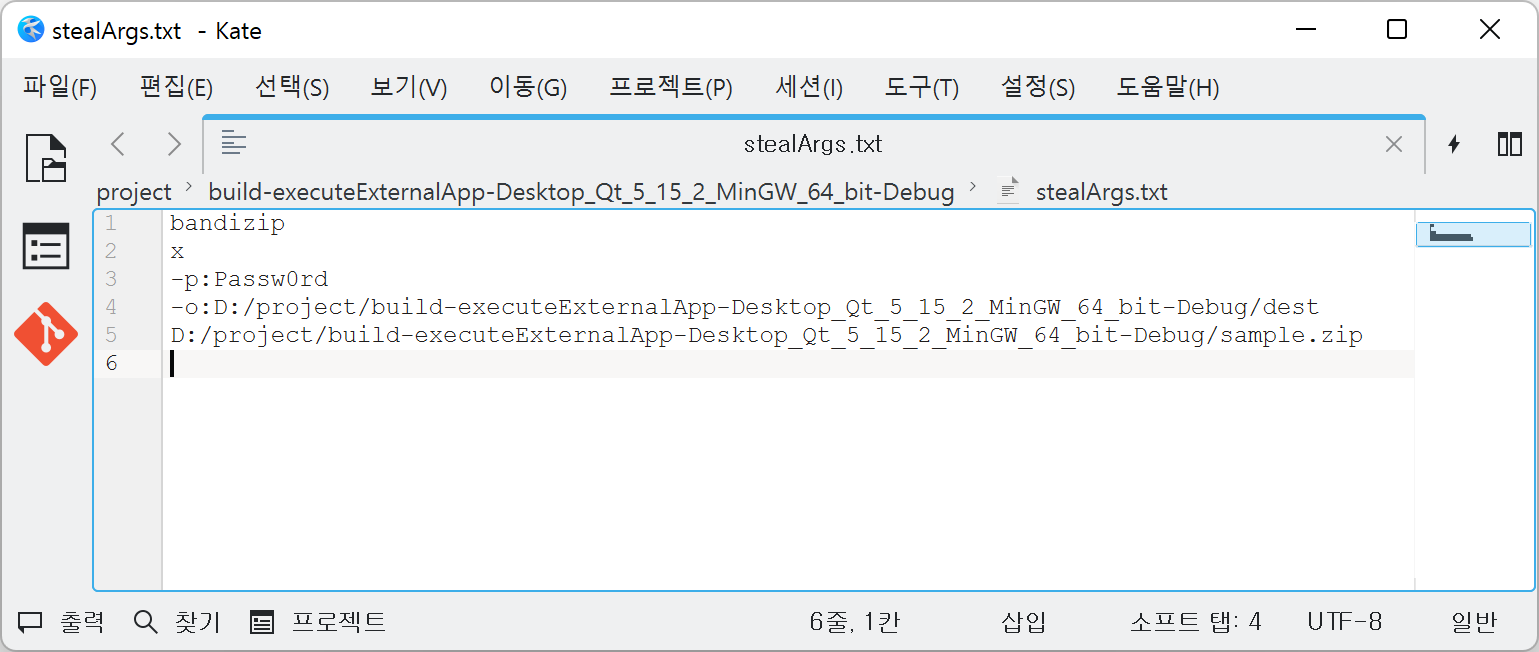올해 초에 Qt Project의 보안팀은 QProcess를 사용하여 전체 경로 없이 다른 응용 프로그램을 시작할 때 발생할 수 있는 보안관련 패치를 제공했었다.
여기서는 이 문제를 재현해보고 QProcess의 올바른 사용법을 알아본다. 아직 패치하지 않았거나 하기 어려운 개발자는 검토해 보시길.
테스트 환경:
Windows 11
MinGW 64-bit
Qt 5.15.2
이 문제는 PATH 환경 변수에서 목적의 실행 파일을 찾기 전에 먼저 해당 앱의 디렉토리를 검색하기 때문에 발생한다. 어떤 나쁜 마음을 먹은 공격자가 같은 이름의 악성 실행 파일을 앱과 같은 위치에 배치하고 정보를 가로 챌 수 있다.
다음과 같이 사용하는 경우가 문제의 원인이다.
QProcess p;
p.start("application", args);예를 들어 애플리케이션이 시스템에 설치된 압축해제 프로그램을 사용하려고 한다. (bandizip 을 미리 설치해 두었다.)
#include <QCoreApplication>
#include <QProcess>
int main(int argc, char *argv[])
{
QCoreApplication a(argc, argv);
QStringList args;
args.append("x"); // Unzip
args.append("-p:Passw0rd"); // Password
args.append("-o:" + a.applicationDirPath() + "/dest"); // Target folder
args.append(a.applicationDirPath() + "/sample.zip"); // Archive
QProcess p;
p.start("bandizip", args);
p.waitForFinished(-1);
}압축파일의 경로 및 패스워드등이 전달된다. 압축파일이 문제없이 잘 풀린다.
하지만 이 문제를 노리고 데이터를 가로채는 프로그램을 앱과 같은 위치에 배치했다고 치자.
가짜 bandizip 구현
#include <QCoreApplication>
#include <QFile>
#include <QString>
#include <QDebug>
#include <QTextStream>
void write(const QString &filename, const QStringList &args)
{
QFile file(filename);
// Trying to open in WriteOnly and Text mode
if(!file.open(QFile::WriteOnly |
QFile::Text))
{
qDebug() << " Could not open file for writing";
return;
}
// To write text, we use operator<<(),
// which is overloaded to take
// a QTextStream on the left
// and data types (including QString) on the right
QTextStream out(&file);
for(const auto &arg : args) {
out << arg << "\n";
}
file.flush();
file.close();
}
int main(int argc, char *argv[])
{
QCoreApplication a(argc, argv);
write("stealArgs.txt", a.arguments());
return 0;
}이 프로그램은 명령줄 옵션을 전달받고 파일에 쓰는 일을 한다.
이제 예제 앱을 실행하면 사용자가 기대하지 않은일이 벌어질 수 있다. 다음 이미지는 stealArgs.txt 파일의 내용이다.

패치하거나 최신버전을 사용하면 좋겠지만 당장어렵다면 애플리케이션의 전체 경로를 확인하여 이런 위험을 줄일 수 있다. 이 목적에 부합하는 QStandardPaths::findExecutable 를 사용하면 PATH 환경 변수를 검색하고 결과적으로 안전한 사용 경로를 제공받을 수 있다.
예제 코드는 다음과 같다.
#include <QCoreApplication>
#include <QProcess>
#include <QDebug>
#include <QStandardPaths>
int main(int argc, char *argv[])
{
QCoreApplication a(argc, argv);
auto bandizipPath = QStandardPaths::findExecutable("bandizip");
if( !bandizipPath.isEmpty() ){
QStringList args;
args.append("x"); // Unzip
args.append("-p:Passw0rd"); // Password
args.append("-o:" + a.applicationDirPath() + "/dest"); // Target folder
args.append(a.applicationDirPath() + "/sample.zip"); // Archive
QProcess p;
p.start(bandizipPath, args);
p.waitForFinished(-1);
qDebug() << "finished";
} else {
qDebug() << "not found command.";
}
}| 번호 | 제목 | 글쓴이 | 날짜 | 조회 수 |
|---|---|---|---|---|
| 공지 | Qt프로그래밍(QtQuick) Beginner를 위한 글 읽는 순서 | 운영자 | 2019.01.05 | 86174 |
| 10 |
Qt 응용프로그램에서 PDF 문서 렌더링
| makersweb | 2021.09.23 | 679 |
| 9 | VirtualKeyboard 스타일 커스터 마이징 | makersweb | 2022.03.13 | 464 |
| 8 | 단일 인스턴스 Qt 응용 프로그램(Single-instance Application) | makersweb | 2022.06.23 | 706 |
| 7 | clazy 로 13개의 시그널, 슬롯 오류 해결 | makersweb | 2022.08.23 | 578 |
| » |
QProcess 보안 권고 리뷰
| makersweb | 2022.09.18 | 602 |
| 5 |
VTK 를 사용해서 강력한 시각화(3D, Plotting, Chart)Qt 응용프로그램 개발하기
| makersweb | 2022.10.16 | 1670 |
| 4 | Qt Property(속성) 시스템 | makersweb | 2023.01.08 | 1889 |
| 3 |
Widgets(C++) 기반의 기본 스타일을 Dark 테마 및 Material 디자인 스타일로 바꾸기
| makersweb | 2023.01.28 | 1313 |
| 2 |
Qt 하이브리드 애플리케이션(Hybrid App) 개발
| makersweb | 2023.02.08 | 1030 |
| 1 |
Qt 응용프로그램에 Web 구성 요소를 표시 with Servo
| makersweb | 2024.04.27 | 162 |